Posted by Amaranth
The Men That Will Not Be Blamed For Nothing
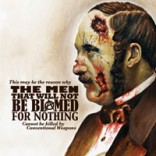
Steampunk. The newest genre to take the alternative world by storm since the glowsticked beats of cybergoth. What’s interesting in this case though, is where it sprung from. While historical offshoots have always been music based, Steampunk is a little different in that the look grew out of literature and the sound was a later addition. This has lead to a question even more perplexing and infuriating than “what is Goth” …. “what is Steampunk”! As expected answers to this have come in all shapes and sizes, but perhaps Now This Is What I call Steampunk gave us a slightly better answer than most. The Men Who Will Not Be Blamed For Nothing put the “punk” back into Steampunk (with a side helping of Metal, Old English Music Hall, Vaudeville and Industrial). Half of the quadruplet earn their bread on the stand up circuit, and this comedy is immediately felt in their lyrical offering. Perhaps Steampunk’s answer to Spinal Tap? The latest offering from The Men comes in the form of an even more tongue twisting title (following a trademark dispute with EMI which leaves us bereft of a Now This is What I call Steampunk vol II), and once again offer up some brilliantly witty fare from Victoria’s Secret being less about enticing underwear and more about queen Victoria the Necromancer, to Poor Georgie an accidently taxidermied son. It was some smidgen of relish I set about an inquisition, the answers of which, as expected, were suitably entertaining. Enjoy…
So we have a new musical offering from you, “This May Be the Reason Why The Men That Will Not Be Blamed For Nothing Cannot Be Killed By Conventional Weapons”. Kinda rolls off the tongue, I guess you wanted to make sure it was easy to request in a club after having a few?
MARC: If you know a club that lets you request entire albums then please point me to it, because that sounds like my kind of club. This was actually the second choice for the album title, I really wanted to call it ‘Use Your Illusion II’, but apparently it’s been done.
ANDY: It weeds out the lazy…it’s a kind of initiation test…if you can’t be bothered to learn the entire title you can’t progress to the next level
JEZ: I wanted to call it “The Men That Will Not Be Blamed For Nothing’s difficult second album”, but we had an argument over where to put the apostrophe and all fell out quite badly. Anyway, it wasn’t difficult – it was a piece of piss!
ANDREW: The title is a piece of Gematria. When translated into Hebrew is has the same numerical value as the phrase “Is this really the best title we could come up with?”
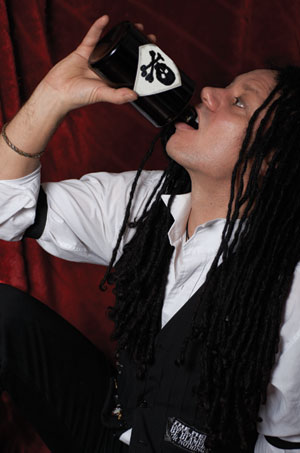 The album sleeve lists “side one” and “side two” but I had problems getting it to play when I turned it over. Are you planning to rectify this issue?
The album sleeve lists “side one” and “side two” but I had problems getting it to play when I turned it over. Are you planning to rectify this issue?
MARC: All good albums have an A and a B side regardless of whether you can actually turn them over. It’s the best way to sequence a record. Actually if you peel off the CD label you’ll find this album actually does have a second side because we used album stock originally intended for the audiobook version of the new Dan Brown novel.
JEZ: Not only is there a second side, but the first side contains a backwards message inserted by me during the mixing stage. The first person to identify and decrypt this message will get a prize. Not sure what yet, but something personally tailored to them. Like maybe an engraved shotgun and a list?
ANDY: The trick is to turn it over twice…then scroll through to the end of the last song you heard.
ANDREW: Rectum.
This album was one you all collaborated on from the beginning, how else is it an evolution from the first?
ANDREW: For me personally, I realised that this band of ours was likely to take up an increasing chunk of my life, and that therefore I needed the music to be more of a reflection of the sort of thing I listen to. The first album was “what should steampunk sound like?”. This is more “what do I want MY band to sound like?”. There are more extreme metal influences – stuff like Entombed, Dismember, Cannibal Corpse on the death metal bits in Margate Fthagn and stuff like Neurosis for The Great Stink. And in terms of structure the songs are more complex. I’ve been wanting to write a song like Mutiny In The Common Soldiery for years.
MARC: That’s really the main difference: the first album songs were mostly written by Andy and Andrew, often to be performed as a duo. When it came to make the jump to ‘full band’ we basically just added drum and bass parts to an existing structure- hardly any of the first record was written in the rehearsal room, where as pretty much all of the new one was. The songs on this album usually started, musically at least, as a riff or chord sequence and then the four of us worked together on creating the whole song. Hence this one is a massive leap forward musically in terms of structure and dynamics- they’re real songs. There’s a lot of three-chords-and-the-truth punk thrown in there as well, but even that came out of a more collaborative approach. This means it’s a much more musically satisfying thing for us to play- we’d have got bored with ourselves if we’d recorded another album of ‘Steph(v)enson’s and ‘Etiquette’s.
This record is a much more extreme version of ourselves in every respect, and I don’t just mean it’s heavier -although in many places it is- it’s also lighter in a lot of places too. There’s nothing as quiet as ‘Poor Georgie’ on the first album, and nothing as crushing as the chorus to ‘Margate Fhtagn’. Everything is pushed a bit further- so the heavy songs are heavier, the lighter songs are lighter, the funny ones are sillier. For example, I think we’d probably have hit the distortion peddle on the chorus for ‘People’s Common Sense Medical Advisor’ on the last record, it’s the obvious thing to do- punk it up- but here we let it sit as a an acoustic/skiffle thing all the way through.
ANDREW: You can hear the influence of Jez and Marc in the more poppy end of our output. Andy and I, if left to our own devices would probably end up sounding like Merzbow or Portal or something. It balances out.
If you really could rewrite history one song at a time, which historical song most offends your senses that you’d set to first?
MARC: Can we have a new national anthem for starters? One that’s not based on killing Scottish people? Or, for that matter, based around the fucking Monarch. I get serious National Anthem envy- every country gets a better one than us. The French national anthem is cracking, even if they did nick it from The Beatles. In fact, if the French can have an anthem based around ‘All You Need Is Love’, I’d quite like ours to be based around the first chord in ‘A Hard Days Night’.
ANDY: Greensleeves…I mean, seriously Henry?… Green?… Sleeves?
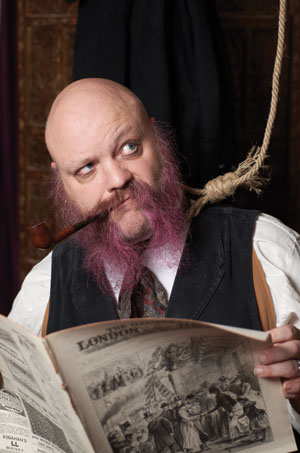 You seem to have a fascination with Jack the Ripper from the Goulston Street graffito to the naming of your record label “leather Apron” (well either that or Jews)?
You seem to have a fascination with Jack the Ripper from the Goulston Street graffito to the naming of your record label “leather Apron” (well either that or Jews)?
MARC: True story- an ex girlfriend of mine told me she was really into Jewish men because she liked ’roundheads’, for years I thought she was talking about those little hats they wear. Turns out that’s not what she meant at all. ‘Roundheads’ is something totality different- bonus though, because I’m a round head after all! (medical reasons). Sorry, what was the question?
ANDY: the Ripper connection once again harks back to an Andrew O’Neill show…this time the infamous ‘Winston Churchill Was Jack The Ripper’…. and a very well researched and convincing argument it is too….
ANDREW: NB: It’s ‘Juwes’, not Jews. So there. (Illiteracy was rife among graffiti artists back then.)
If Jack The Ripper were a Steampunk Villain, how would you retell the story?
ANDREW: He’d get caught after Polly Nichols ‘cos they’d have CCTV and DNA forensics. It’d be a disappointing story.
MARC: Isn’t that just Alan Moore’s ‘From Hell’ with airships?
ANDY: And steam driven power tools…perhaps a Jack (the Ripper) Hammer
JEZ: Quite loudly, pretty quickly and fairly messily.
Do you think Steampunk is more an aesthetic, a mindset or a sound? Why?
JEZ: I suppose it depends by who you meet. To a lot of Steampunks dressing up as a rich Victorian and affecting a plummy accent seems to be enough. Most of our audience seem to have taken the punk part a bit more literally and have mashed up an interest in Victoriana and the creativity of early punk to come up with their own thing.
ANDREW: It’s an aesthetic, primarily. It’s taking what you like from Victoriana and mashing it up with modern stuff. In terms of mindset there is a strong DIY and participatory ethic. People join in. There is no barrier between audience and performer, between people who make stuff and those who consume. We share skills and we look out for each other.
MARC: It’s definitely not a sound. I’d like to think of it as a healthy disregard for the past and the willingness to re-invent history: set your imagination to ‘Victorian Mode’ and then push the whole world through it. I’m not sure that’s how other people see it.
ANDY: Google ‘steampunk laptop’…that’s what it means right there…what’s not to like?
I’ve heard quite a variation in what is labelled as “Steampunk” in music, why do you think this variation exists and how would you define the sound?
MARC: There is NO sound. There seems to be a default, which is a sort of gothy baroque Pirate thing in Waltz-time that substitutes references to comic books for actual ideas. A kind of hum-drum mash up of Nine Inch Nails, Nick Cave and the Dresden Dolls that ignores the fact that those three artists are entirely unique- which is what makes them amazing. Most of the bands that do that are shit. I’m not sure why that it is, the ‘Punk’ in Steampunk has never meant punk rock but it seems weird that no-one made that the touchstone before us. Don’t get me wrong, there are some brilliant bands that come under the ‘steampunk’ heading, those are the ones that do what I mentioned earlier- set their brains to ‘Victorian’ and push their existing musical impulses through it. The best ones we’ve played with- Sunday Driver and Frenchy and the Punk are good examples, do something much richer. I guess part of the joy of the ‘Steampunk scene’, such as it is, is that there’s a broad church when it comes to music. That said, we’ve always considered ourselves set aside from that. But then seeing ourselves as outsiders in every context and annoying the people on the inside, is pretty fundamental to the band.
ANDY: Someone once said the scene was like punk before everyone wanted to sound like the sex pistols….. anything goes.
US steampunk bands vary from world music gothic synthy stuff to dark cabaret to Tom Waits-a-likes to old time mississippi jazz and banjo music….there is a huge range of sounds, but all the bands share a common love of the victorian sci fi aesthetic.
Andrew: Basically, if it’s Victorian themed, with some anachronistic twists, it’s steampunk.
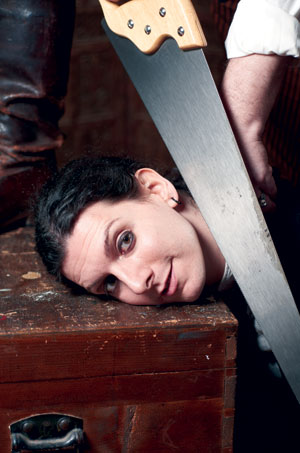 And how would you define your sound? (The new sound?)
And how would you define your sound? (The new sound?)
MARC: Old school punk. As old school as it’s possible to be.
ANDREW: Post music-hall.
ANDY: it’s punk rock from the 1880s…with added zombies, Lovecraftian Elder Gods and misused science
JEZ: Chirpy music hall meets thrash metal round at the Dead Kennedys’ house. It then drinks all their beer, steals guitar riffs (from an unattended riff cupboard) passes out and then pisses on their carpet.
Describe the experience of a person attending one of your shows.
MARC: Baffled, sweaty enjoyment. It’s quite a weird experience seeing us play, not because of the band, but because we attract a really odd mix of people: we’re a punk band, and musically that comes first, so that obviously brings its own audience of crusty rockers, metal heads and weirdos- our kind of people- but then the Steampunk thing will bring the top-hat brigade, the old goths, and the cos-players, and then because Andrew and me have comedy careers that brings another group. So the main experience of our gigs is those disparate subcultures wondering who the fuck everyone else is. One day I’d like to see them all have a fight, but usually by the end of the show they’ve just merged into ‘audience’.
ANDREW: We put on a fucking good show. What amazes me is how we cross over. Mates of mine who are proper underground metalheads – the sort who like black metal but not death metal – really like us. Our shows are fun, but intense and heavy. The light bits and the funny stuff seem to make the crushing satanic chaos seem acceptable to people who’d NEVER listen to that sort of thing, and the death metal vocals and chaotic post-hardcore riffs make the daft bits acceptable to the patch-denim jacket types. It’s pretty satisfying.
You’re the most conspicuous Steampunk band in the UK, yet the USA seems to have spawned quite a number. In my mind it also seemed to start there (certainly my earliest references from the genre were American) why do you think it took off there first/more?
MARC: It’s lot easier to Fetishize Victorian England from a remove. We’re a bit more exotic.
ANDY: I’m not.
You’ve played there, are there any noticeable difference between the two countries interpretation of the theme?
MARC: The Americans have more of a Cosplay/Comic Book Convention approach. It’s a bit geekier over there. As I said they tend to Fetishize Englishness a bit: If you go to American Steampunk events a LOT of people affect English accents- until they meet us, then they go oddly quiet. The Brits tend to be more into the engineering aspects, which is something I’m really very proud of.
ANDY: From what I’ve seen there is a lot more cosplay/LARP/gaming in the American scene, but they really go for it…the modded stuff from the states is phenomenal…i have real skills envy when I see some of their work.
ANDREW: It’s more of a lifestyle over here. The Americans tend to do it at weekends. We plug it more into the rest of our lives. I think that might be because America is a new country. I live in a Victorian building. They don’t have many of those!
Half of you are comedians, and by an odd turn of fate I happened in on one of Marc’s more low key routines. Why do you think the “darker” scenes appreciate humour when conventional wisdom paints the stereotypes in a different light?
MARC: By ‘Low key’ do you mean ‘poorly attended’? Welcome to my world…Andrew’s a lot further up the comedy tree than me (it’s a real tree by the way, we have to visit it once in our career. it’s one of the 5 Pillars), I still do the slum gigs. Do the ‘Darker’ scenes appreciate jokes more? I’m not sure. One of the reasons we stand out, both as a band and in the Steampunk context is because we do jokes, but it’s also the thing that makes us most accessible outside of those cultures. You might not get the funny hats, the metal guitars or the eyeliner, but the jokes cross over. If you mean ‘why would humourless Metalheads like a laugh’, I think sense-of-humour goes past corpse paint. Making a Goth laugh is a joy to behold.
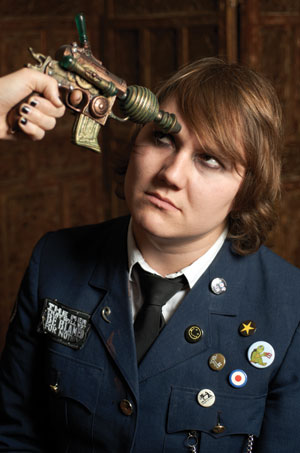 Do you think you’re funny?
Do you think you’re funny?
ANDREW: Well, comedy pays my rent, so I kind of hope so…
MARC: Yes. No-one gets onstage to make people laugh unless they find what they’re saying funny themselves. Besides, making each other piss-ourselves laughing is pretty much the main occupation for this band. Interestingly, I don’t think Andy knows how funny a writer he is. People don’t realise some of our funniest lyrics actually come from him.
JEZ: We do have a right laugh in our rehearsals, which to be honest makes a real change from some bands I’ve played in. I love stupidity for its own sake so doing the odd reggae version of one of our songs, or playing through the whole set in the voice and style of Lou Reed keeps it fresh. Some songs on this new album are funny as fuck, but leave me wondering why on earth did you write a song about an irritating old lady being raped and eaten by a sea monster or a piece of badly performed and unwarranted taxidermy. The sheer pointlessness of some of it is brilliant!
Music and comedy go together like…
MARC: “…two things that traditionally complement each other very well”. That whole thing about them being separate is a relatively new idea. Populist music (rock and pop) and stand up comedy both come from Music Hall. From the late 18th century onwards the pissheads and the rotters would get their kicks from cheap, baudy entertainment and everything from us to Girls Aloud, to Michael Macintyre has its roots there. George Fornby was a comedian and he was a popstar with exactly the same act and no-one ever thought to separate the two. As recently as the 70’s successful music acts were expected to be Variety turns. It’s a shame it doesn’t happen more.
On a more serious note, perhaps a D Minor, you weave in some definite issues into your songs – much like the punk genre you are influenced by. What do you most take a stand for?
MARC: Pissing as many people off as we possibly can. We are firmly and proudly anti-establishment. Name an establishment and we are probably anti it.
ANDREW: Personally, veganism. As a band: anti-sexism, anti-homophobia, anti-concentrations of power. And celebrating the underdog rather than those in charge.
ANDY: Refusing to take authority seriously… and fighting for the rights of the downtrodden common man…or zombie
JEZ: I’m anti Tory, because they’re anti the rest of us. If I was rich and unprincipled I’d vote Tory, but all the people in the bottom half of our society who vote Conservative absolutely leave me speechless. Well they don’t actually because I have a few choice words both for and about them. The great sleight of hand of the Tories is to make a bunch of not particularly well off people blame a set of even less well off people for their financial shortcomings, whilst the rich are quietly allowed to get richer. They’re selling off the NHS now and I think we can safely assume that another bunch of greedy Tory party funding weasels will be first in line to profit. How can they do it? How can they sell OUR health service without asking us? More pertinently, why would you ever trust someone who profits from another’s illness and infirmity?
You have a very English sound. Not only through your accents and nod to punk, but the whole feel of the music is one of grimy sincerity, of a man just trying to earn an honest wage. This is slightly contradictory to the characters mostly portrayed by the Steampunk community who opt for a more high society persona. What made you make it so “street”?
MARC: I’m really glad you picked up on this, because the class role-play element is easily the most annoying part of the whole thing. I don’t get why so many people think ‘English Toff’ is the coolest thing they can aspire to be. Do they also pretend to have slaves and wives with no rights? The thing is, as I said, I always see us in the Music Hall tradition- the people that went to the Halls in the 1830’s would be the punks and the dropouts now. Punk rock and metal has never worked when it was aimed at the top end of society, it’s only every flourished on the ground, so that’s where we flourish too. Despite the fact we own computers and do ‘the arts’ we’re all from working backgrounds, it would never occur to us to do it any other way.
ANDREW: It happened very naturally. It was just instinct. The really interesting stuff in the era we love is the grim underbelly of the richest nation on earth. Something like 80-90% of people were working class in the 1880s. So why not tell their story?
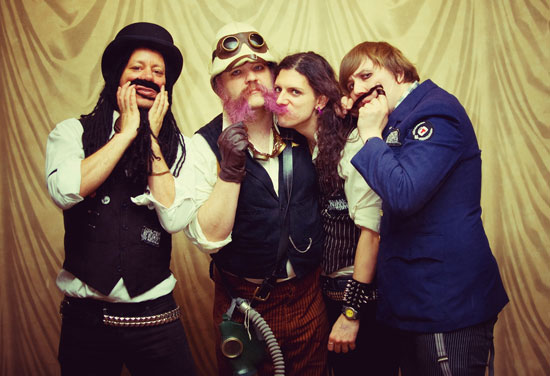
Do you think your music rides on the coattails of the genre? Do you think without the aesthetics and movement behind it that you’d find yourself a fanbase elsewhere?
ANDREW: The popularity of the band has definitely been helped by it, but frankly it’s our unwillingness to accept other people’s notions of what steampunk should be that people like about us. We are moulding the genre to fit us. We want people to think of us when they think of steampunk. Ha! Hubris!
MARC: It’s an interesting point. Steampunk gave us our start, and a ready made fan base because there were (and are)lots of people involved in that scene who weren’t being served musically because of the Pirate Waltz’s. But I’d hate to think that’s all we were. If you ignore the Steampunk scene entirely, the Victorian aspect of what we do makes us stand out from pretty much any other punk band you can find, and increasingly our fan base is moving way beyond Steampunk- which we’re quite happy with because it can be quite a closed community. You don’t have to have read ‘The Difference Engine’ to enjoy us- we’re a pretty solid heavy punk band with jokes. The Victorian thing just gives us a gang-mentality and a uniform- which never did Kiss or The Ramones any harm.
ANDY: We were originally an offshoot of Andrew’s Edinburgh show, Andrew O’Neill’s Spot On History Of British Industry’….me and Andrew doing a few Victorian themed songs on Guitar and Musical Saw as an opening turn when he toured the show round the UK. I was totally unaware of the Steampunk scene when we started, but they adopted us as their own and we have met some lovely people through it. Creative, artistic artisans who we are proud to number as our friends. I wouldn’t say we leapt on its coattails as much as got swept along by its wave.
You are self released through your own label. What have you found the benefits and pitfalls of this are and would you ever consider signing to someone else?
MARC: Being in control of every aspect is pretty useful- no-one has to approve the artwork or the concept or the lyrics, the band pays for everything itself so we’re only answerable to ourselves. And I think we’re pretty likely to continue that way- sometimes it would be nice to just hand the whole thing over to someone else and just go “here, take it, make the covers, book the gigs, sort out the distribution, we can’t be arsed” and the extra budget would be nice, but then we’d lose all the control.
JEZ: It’s nice to be able to make all our own decisions. Whenever you interact with the music business, someone always wants a piece. Managers, A&R, pluggers you name it, they all want some form of input to satisfy their creativity/ego. We don’t really make much money so that’s not an issue, but being autonomous and undiluted is important to us.
ANDREW: I get a lot of emails.
Steampunk has its origins in the written word and is infused with invention. If you could invent any word to be in everyday use, what would that be and why?
MARC: I’m trying to popularise “Beidophile”, it means “Adults who are fans of Justin Beiber”.
ANDY: Mext…the one after the next one (my son Tommy just suggested this)
The much talked about trademark infringement EMI brought against you was resolved with a name change to the title of your first album. Clearly the original title “Now That’s What I Call Steampunk vol 1” was a play on their strap line, what’s your general thought about emulating and parodying someone or something else? Should people be allowed to trademark or protect their ideas and creations?
MARC: Obviously you’ve got to draw the line at out-and-out copying and claiming it as your own, but outside of that it’s fair game. Everything is up for grabs to be Parodied certainly. You just need to have a sense of humour and sense of perspective, clearly lacking in EMI recently. If we’d called the album ‘NOW 44’ I could understand, but surely anyone with half a brain could spot the parody. But then anyone with half a brain wouldn’t be clinging to the traditionally music industry model anyway.
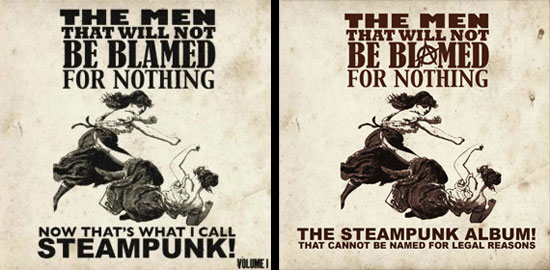
And lastly, what do you think you should most be blamed for?
MARC: Being upstarts who think everything is funny and don’t know when to shut their mouths, the end of Britain as a world power, scheduling Doctor Who against Coronation Street int the mid 80’s and the disappearance of Madeline McCann.
ANDREW: The downfall of modern civilisation.
ANDY: Nothing.
JEZ: Personally, nothing. Ever.
Published in Devolution
